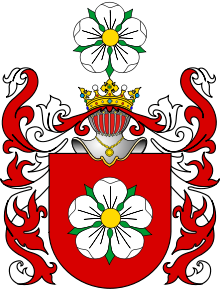
Back جوسافات كونتسيفيتش ARZ Іасафат Кунцэвіч Byelorussian Язафат Кунцэвіч BE-X-OLD Josafat Kuncewič Catalan Josafat Kuncevič Czech Josaphat Kunzewitsch German Josafat Kuncewicz Spanish Jozafat Kuncewicz Estonian Josaphat Kuntsevych Finnish Josaphat Kountsevitch French
Saint Josaphat Kuntsevych | |
|---|---|
| Archeparch of Polotsk | |
 | |
| Church | Ruthenian Uniate Church (present-day Ukrainian Greek Catholic Church) |
| Diocese | Archeparchy of Polotsk |
| Appointed | 1618 |
| Term ended | November 12, 1623 |
| Predecessor | Gedeon Brolnitskyj |
| Successor | Antonius Sielava |
| Orders | |
| Ordination | 1609 |
| Consecration | 12 November 1617 by Archeparch Gedeon Brolnitskyj |
| Personal details | |
| Born | Ivan Kunchych[1] c. 1580 |
| Died | November 12, 1623 Vitebsk, Vitebsk Voivodeship, Polish–Lithuanian Commonwealth |
| Coat of arms |  |
| Sainthood | |
| Feast day | November 12 (Latin Church, Ukrainian Greek Catholic Church,[2][3] Belarusian Greek Catholic Church, Romanian Greek Catholic Church, Ruthenian Catholic Church[4]) November 14 (General Roman Calendar of 1960) |
| Title as Saint | Bishop and martyr |
| Beatified | May 16, 1643 Rome by Pope Urban VIII |
| Canonized | June 29, 1867 Rome by Pope Pius IX |
| Patronage | [Ukraine]The St Leonards academy |
Ordination history of Josaphat Kuntsevych | |||||||||||
|---|---|---|---|---|---|---|---|---|---|---|---|
| |||||||||||


Josaphat Kuntsevych, OSBM (c. 1580 – 12 November 1623) was a Basilian hieromonk and archeparch of the Ruthenian Uniate Church who served as Archbishop of Polotsk from 1618 to 1623. On 12 November 1623, he was beaten to death with an axe during an anti-Catholic riot by Eastern Orthodox Belarusians in Vitebsk,[a] in the eastern peripheries of the Polish–Lithuanian Commonwealth.
His death reflects the conflict between the Eastern Orthodox Church and the Eastern Catholic Churches that intensified after four Ruthenian Orthodox Church (Kiev Metropolitanate) bishops transferred their allegiance from the Ecumenical Patriarchate in Constantinople to the Holy See, under the terms laid down by the 1439 Council of Florence, by signing the 1596 Union of Brest. Archeparch Josaphat remains one of the best-known victims of anti-Catholic violence for his role in both personally accepting and very effectively spreading the Eastern Catholic Churches as a hieromonk and bishop,[6]: 57 [7] and was canonized in 1867 by Pope Pius IX as a saint and a martyr of the Catholic Church.[b]
In response to the nickname "The Soul-Snatcher", which Josaphat received from both his Orthodox and Calvinist opponents, his biographer, Fr. Demetrius Wysochansky, has written:
"In summing up his pastoral activities which were directed towards the one goal of snatching souls, his contemporaries and witnesses to his life were able to say: 'Whatever Catholics there are in Polotsk, are the fruit of the pastoral labors of Josaphat.' To this statement one may add that whatever Catholics there have been in Lithuania and Byelorussia in the 350 years since Josaphat's death, may all attribute their Catholic Faith to the labors and blood of Josaphat, the 'Soul-Snatcher.'"[9]
- ^ Sas, P. Ivan (Kunchych) Kuntsevych. Encyclopedia of History of Ukraine.
- ^ "Церковний календар УГКЦ на 2024 рік".
- ^ "Місяцеслов Української Греко-Католицької Церкви".
- ^ "Calendar of Saints (MCI)". mci.archpitt.org.
- ^ Cite error: The named reference
Wilson2011was invoked but never defined (see the help page). - ^ a b Kempa, Tomasz (2010). "Religious relations and the issue of religious tolerance in Poland and Lithuania in the 16th and 17th century" (PDF). Sarmatia Europaea. Wrocław ?: Instytut Historyczny Uniwersytetu Wrocławskiego ?. pp. 31–66. ISSN 2082-5072. Archived (PDF) from the original on 2014-12-02. Retrieved 2014-12-02.
- ^ Cite error: The named reference
Subtelny2009was invoked but never defined (see the help page). - ^ "Ukrainian Greek Catholic Church". Religious Information Service of Ukraine. Lviv: Institute of Religion and Society of the Ukrainian Catholic University. 2011-08-15. Archived from the original on 2013-03-20.
- ^ Demetrius E. Wysochansky, O.S.B.M. (1987), Saint Josaphat Kuntsevych: Apostle of Church Unity, Basilian Fathers Publications. Detroit Michigan. Page 80.
Cite error: There are <ref group=lower-alpha> tags or {{efn}} templates on this page, but the references will not show without a {{reflist|group=lower-alpha}} template or {{notelist}} template (see the help page).